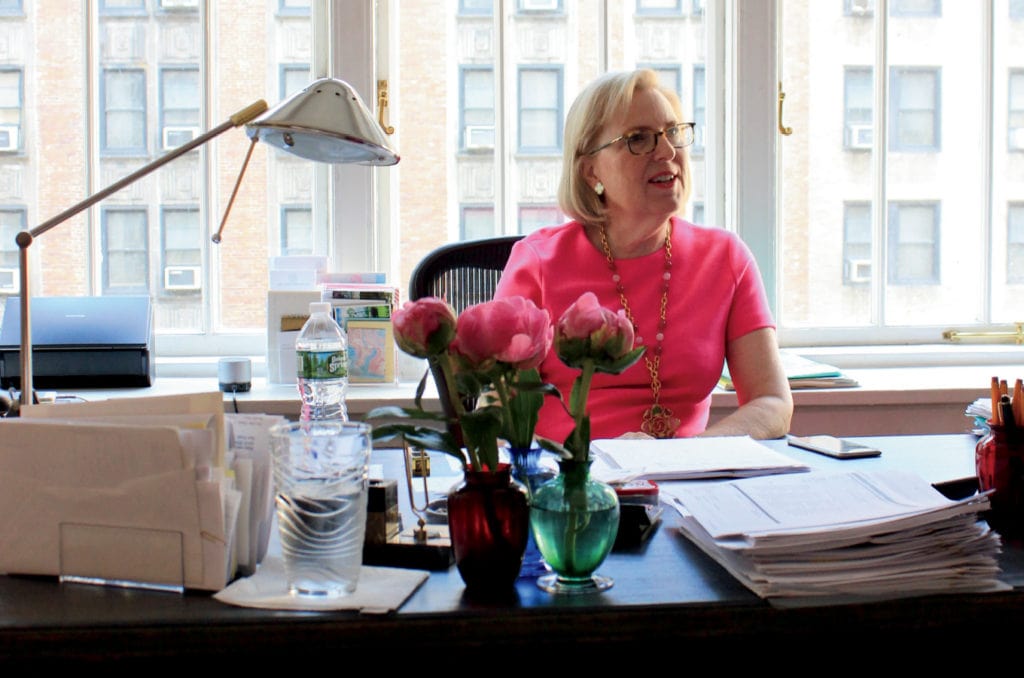Terry Steiner asks herself, “Can it really be 25 years ago that I started my own film distribution company?”
As told by Terry Steiner to Caroline Ku
As someone who represents film companies and places their movies on airlines all over the world, I’m on the phone constantly. But there is one particular call I remember fondly. It was a 7:30 a.m. wake-up from my then boss at Metro-Goldwyn-Mayer/United Artists (MGM UA): “Steiner, get yourself down here,” he said. By the tone of his voice, I thought I’d done something wrong. I rushed down to the hotel restaurant to meet him. And there he was, having breakfast with James Bond – from Goldfinger and You Only Live Twice. We were in LA to discuss the release of The Great Train Robbery, but I had been called down to meet Sean Connery, who was starring in the film!
Having been raised in the film business, I feel very comfortable around film people – behind and in front of the camera. My father was an entertainment lawyer who represented Sophia Loren, David Lean, Omar Sharif and Jacques Cousteau. It wasn’t uncommon to see these people visiting our house in the suburbs of New York City where I grew up. And having worked in the entertainment and media industry myself, I’ve also met many celebrities. However, having breakfast with Sean Connery was very cool.
“Having been raised in the film business, I feel very comfortable around film people – behind and in front of the camera.”
Growing up, I hadn’t any idea what I wanted to do. In college, the common first-job coup was to be accepted into a bank-training program, and so I applied. And even though I wasn’t very good at math, I got accepted into the program at Bankers Trust. I clearly remember the first day when they assigned us to different departments and I was assigned agricultural banking. Agricultural banking! I headed straight to the bathroom, got sick and never went back.
I then got a job as the traffic manager of the Entertainment and Leisure Division at Grey Advertising and that was where I felt my career was finally taking off. I loved that job. It was a lot of responsibility. I knew nothing about how to do it and had no one to teach me, but I showed myself the ropes and climbed the ladder and became an account executive. After that, I was hired by MGM UA as a media director. It was another unfamiliar role, yet I had 20 people reporting to me, as well as local ad agencies around the country, and handled all of the company’s media planning and placement. When the company moved to LA, I moved to Paramount Pictures in New York and did the same work.

One day, I got a call from the head of Sales at Orion Pictures, whom I had worked with at MGM UA. He said he had an opening to run the non-theatrical division of Orion. It was an interesting offer, but again, I knew nothing about it and hesitated. A mentor of mine said, “Terry, if you don’t take this job, you’re crazy. It’s so much more fun to be in sales than in media. You’re actually making money for the company rather than spending it.” So, I took the job at Orion and it was there that I found true happiness at work.
But Orion as a company wasn’t doing so well, and I was frustrated with constant changes in management and the possibility of a relocation to Los Angeles hanging over me. I wanted to take my life into my own hands and I wanted to stay in New York. I had this feeling in my gut that I should start my own business. I thought, if I don’t do it now, when am I going to do it? And so, I took the plunge.
Our first office was a shared space at Rockefeller Center, where we stayed for two years before moving to our current location on 57th Street (Tony Bennett was a neighbor!). Most of the entertainment industry is in LA, but here in Midtown Manhattan, next to Carnegie Hall and Central Park, I feel as if I’m in my own world. I start the day with a little “Terry Time”: I may hit the gym or indulge in the New York Post at the local coffee shop.If it’s a Monday, I’ll stop by the florist to pick up three single-stem flowers for my desk. From there, it’s a short walk to the office and I’m usually in by 10 a.m.
I have an illustration in my office of Eloise at the Plaza with her pet turtle and dog dancing around her. When I’m at work, I feel like Eloise in this drawing – happy in my life, doing what I love, surrounded by my team whom I treasure. When I’m not watching movies or TV shows or traveling, I’m yacking on the phone, calling clients, making business deals. At lunch, you’ll find me at Trattoria Dell’Arte or the media-chic Michaels. Sometimes I’ll go to Bergdorf’s and have a salad. But Elaine’s, which is now closed, was the entertainment hangout we all went to.
“When I’m at work, I feel like Eloise in this drawing – happy in my life, doing what I love, surrounded by my team whom I treasure.”
Once, I was bidding against a major competitor on a Robert Altman film. The distributor called to say they wanted me to handle the film; however, I had to come in with a higher estimate than the competitor had given them. I told them I could beat that number, but on one condition: The film had to be edited.
Robert Altman was a most prestigious and serious director, so the thought of him letting someone like me edit one of his films was a bit presumptuous. Still, I put together an edit list and sent it to the distributor. That night, my husband and I went to Elaine’s, and there, having dinner, was Robert Altman with his wife Kathryn, whom my husband knew. I glanced over at my husband and said, “Whatever you do, don’t say anything about the film because business is business, and Elaine’s is Elaine’s.”
As we’re leaving the restaurant, my husband walks over to Altman’s table, introduces me and tells him I’m interested in working on his film. And he said, “I hope you’re not the idiot who sent that edit list.” And I said, “Yes, that was me.” I ended up sitting down and talking to him for 20 minutes. “Look, it’s a business decision,” I reasoned. “You can either make a little amount of money or you can make a lot.” And the next day, I got the green light to edit the film. We turned the five-figure estimate into a seven-figure number on the film. And from then on, Altman let me do whatever was needed to edit his films. He just trusted me. And there are more stories like that.
Having a difficult film and overcoming the odds to do more than anyone ever expects is a great feeling. What I love is the rare occasion when the airline sales out-gross the theatrical sales. Miss Potter is one of those films. Also exciting is when a distributor thinks it’s impossible to make a sale and we do. The Piano was one of our first – an award-winning film that was sexually charged with frontal nudity. Director Jane Campion’s sales company was shocked and delighted with the news that it would be in flight. Every time we do something a little unusual like that, it solidifies our relationship with our filmmakers.
When I started my company 25 years ago, in 1993, my dad was very nervous about it all. He saw me as his little girl, not a businessperson, basically. Once he got over the fact that I was determined to do this, he was excited, too. He gave me some excellent, excellent advice – rules that I still live by. Don’t ask me what they are, but in terms of my deal-making, he made me promise that I would do certain things, which have been lifesaving to me.
He also came up with the name for my company: On my first day of being on 57th Street, I was walking down 6th Avenue and he happened to be walking up 6th Avenue. Our eyes met, and it was just one of those beautiful moments: He threw open his arms and shouted, “Terry Steiner International!”
A few years ago, I decided to add my company name and logo to the opening credits of the films we placed on airlines. It’s a wonderful feeling when I see a passenger watching a Terry Steiner International film. It’s like seeing my name in lights.

“In the City of Dreams,” was originally published in the 8.4 September/October issue of APEX Experience magazine.


